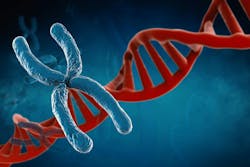Johns Hopkins Medicine researchers say they have found that specific variations in three genes related to maintaining the length of telomeres — the protective DNA endcaps on chromosomes — may explain up to 4.5% of papillary thyroid cancers.
The findings, published online April 29 in The American Journal of Human Genetics, follow previous research results from the Johns Hopkins scientists that very long telomeres are linked to development of certain cancers.
Of 18 people with variants in three telomere-related genes, 15 (83%) developed a second cancer. Most frequently, these cancers were melanoma, sarcoma and cancer of lymphocytes (such as lymphoma and multiple myeloma). Their family members, who carried the same gene variants, were also prone to papillary thyroid cancers as well as other malignancies.
Scientists have known that 5%-10% of papillary thyroid cancers are heritable in some families, and that people with the condition may be prone to developing other cancers.
The researchers say the findings suggest that a mechanism underlying this risk may be longer telomeres.
The scientists analyzed the genetic sequence of five genes related to telomere maintenance in 200 people with papillary thyroid cancer from 189 families who had volunteered to be included in a registry at the Ohio State University.
About one-quarter of the 200 people had hereditary thyroid cancer or secondary cancers to thyroid tumors or were males who developed thyroid cancer at a young age. They found nine people from seven families (4.5% of the 200) had genetic variations in at least one of three genes (POT1, TINF2, or ACD) already linked to telomere maintenance.
Of the people with those gene variants, the scientists measured their telomere lengths and discovered that five of them had very long telomeres — longer than 90% of most people — and three had ultra-long telomeres — longer than 99% of the population.
In another group of 270 people with papillary thyroid cancer not included in the hereditary cancer registry, four of the 270 (1.5%) had variants in those same three genes.

